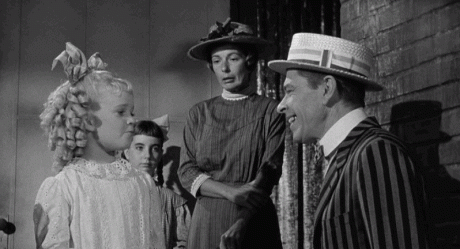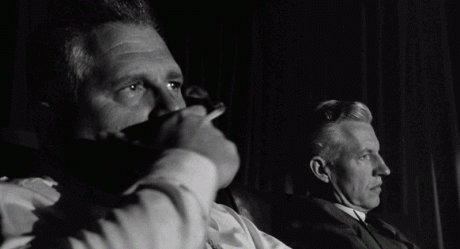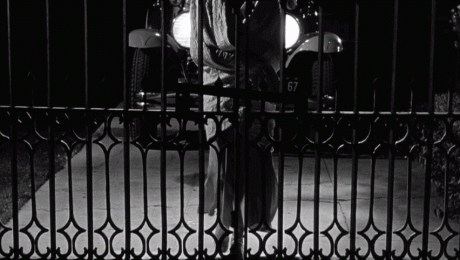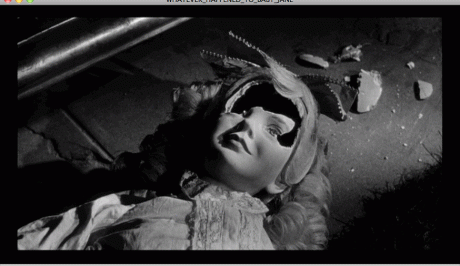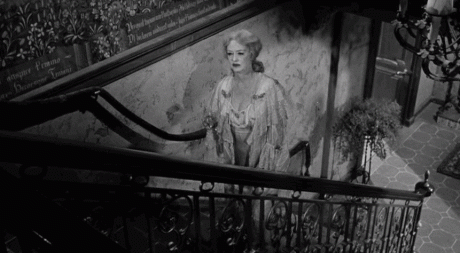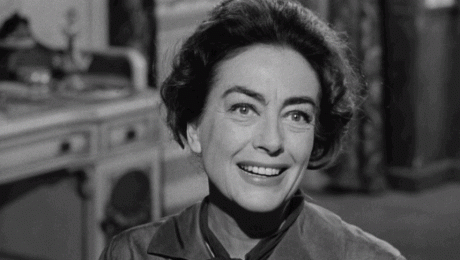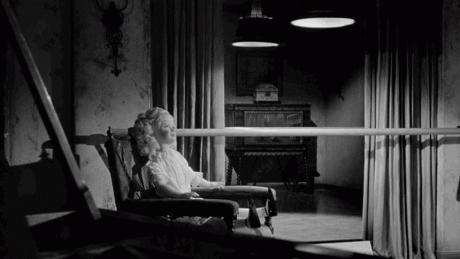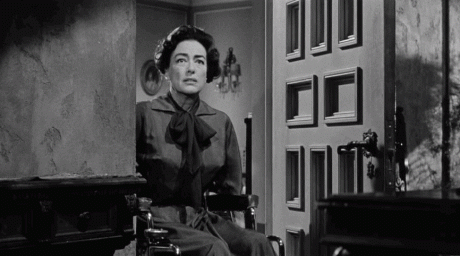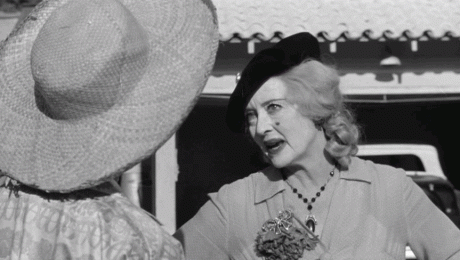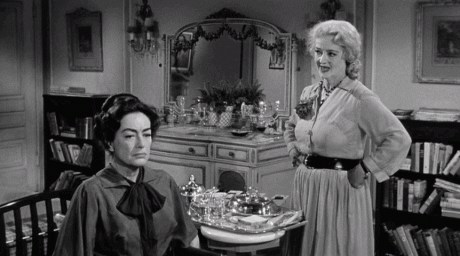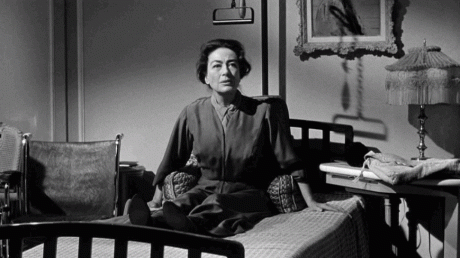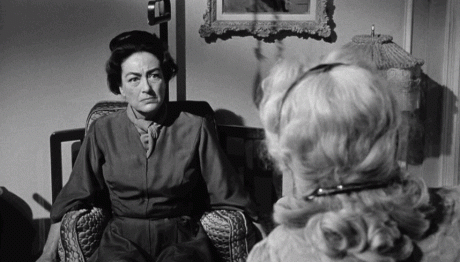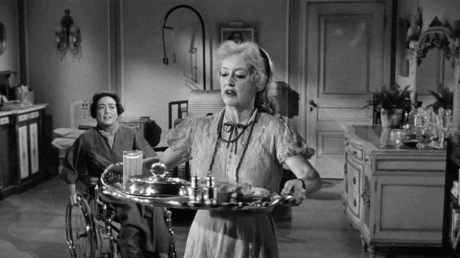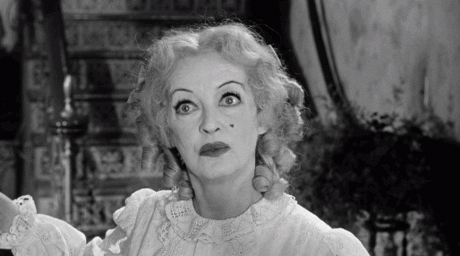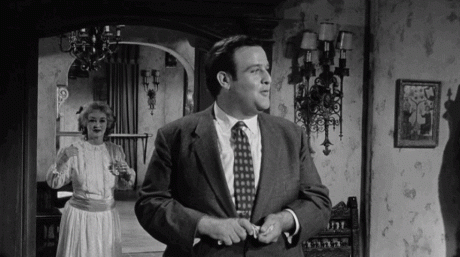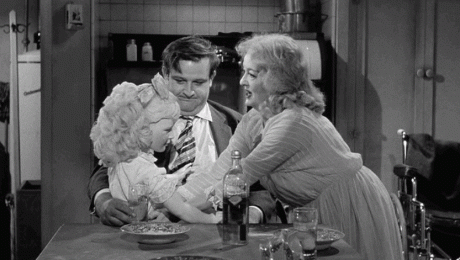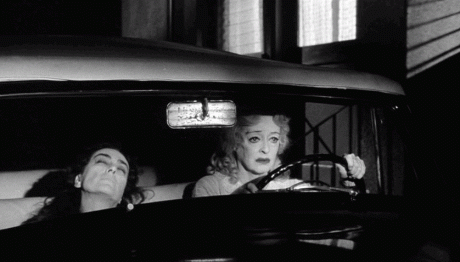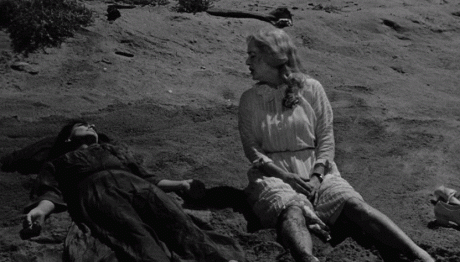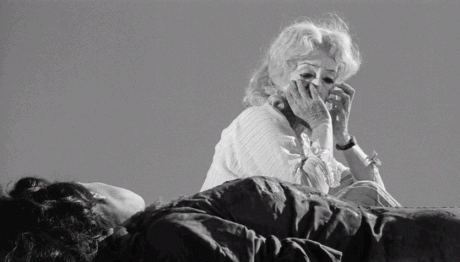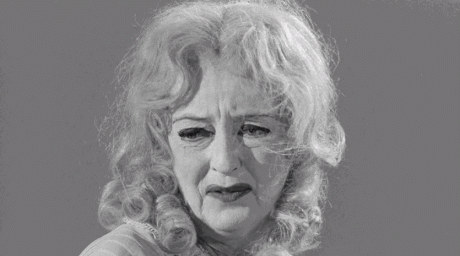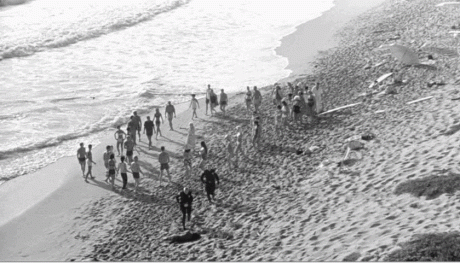Read Part 2 HERE:
What Ever Happen To Baby Jane (1962)
Aldrich’s film really became the turning point in pictures that synthesizes the golden age of Hollywood in theory – that imposes a tragic, painful disjunction for actresses who age out of their prime function as desirable movie stars. What Ever Happened to Baby Jane? gave rise to an entire movement on screen that featured Hollywood’s most essential women paraded out either as emblems of archaic desire or in the case of Baby Jane Hudson, a pageantry of the grotesque. Bravo to Bette Davis for taking on the myth and using dark satire to flip it on its head.
At the start of Baby Jane, the screen is pitch black, we can hear a child sobbing. The 1st prologue begins in 1917. The screen still blacked out, we hear a man’s voice say “Don’t you want to see it again, little girl?” This is setting up an eerily invasive narrative as we do not know yet if it is something sinister making the child cry. The male voice adds “It shouldn’t frighten you” then a quick jump cut and we are able to see a Jack in the Box toy popping up, causing terror in the child. Now we actually see the little girl staring at the toy with tear-soaked cheeks as she gasps for air. The toy has disturbed her with its quick movements and odd expression. There is a shot of its peculiar face which has an uncanny shedding of tears down its tin cheeks. The use of children’s toys in horror films has often been used as a mechanism to evoke fear or otherworldly dread in us as if they might embody some incarnate evil. Here is a great link to Horror Film History’s website.
http://www.horrorfilmhistory.com/index.php?pageID=childsp
Next, we hear vaudeville music and see Baby Jane Hudson’s name up in lights on the marquee of the theater. The theater is sold out, Jane is tap dancing in the spotlight, to Stephen Foster’s “Swanee River” in front of a packed house. Her father is waiting off-stage with Blanche and their mother. He is rallying her with encouragement from the wings while the wife looks solemnly at him, simultaneously young Blanche is looking at him with resentment. Both figures are feeling left out. Young Blanche is played by Julie Allred who was marvelous as little Priscilla in the Boris Karloff Thriller episode Mr.George.
Mr Ray Hudson, played by Dave Willock, comes out to a cheering audience holding a banjo and tells the crowd Okay, folks, one final request. A little freckle-faced boy stands up and requests, “I’ve Written A Letter To Daddy.” And so the lights dim and father sits at the piano to accompany his little girl on this very popular tune. The voice has such a warbling vibrato that it makes little Jane sound bizarre and incongruous (no offense to the singer Debbie Burton) as a child’s voice. She sings with such a sugary exaggeration. Jane’s got the affected style of performer down to all the overreaching body gestures indicative of a ham. Holding the letter to her heart, kissing it, looking upward toward the ceiling, sky. “And wish you were here with us to love.” As she sings this line, she wraps her arms around herself, clinging as if the embrace is for a lover but meant for her father.
Mr Hudson, Jane’s daddy comes out from behind the piano and joins his daughter in a dance, which makes them appear as if a romantic couple. From the side of the stage, we see the expressions on Mrs. Hudson’s face and young Blanche, there is obviously no room in the father and Jane’s relationship for either sister Blanche or the mother.
After the performance, a little boy runs on stage and hands Jane a replica Baby Jane doll of her very own. Jane’s daddy is a showman all the way, “folk’s have you ever seen such a lovely doll” (he in fact has objectified his daughter, as well as exploited her for profit, “a genuine Baby Jane” doll. “And kids remember you can tell your moms that each and every one of these genuine beautiful great big dolls is an exact replica of your own Baby Jane Hudson.”
We see a frame of little Jane cheek to cheek with her doll, enlightening us to the fact they are similarly objects for spectacle. Aldrich uses a “jump cut” with Jane’s face juxtaposed with the doll’s face which creates an oddness in which we are supposed to see a similarity between Jane and the doll, and by the way she is posed, it suggests a sexualized Jane as well.
The crowd is applauding; young Blanche looks on with a sullen sharpness.
Once we go behind the scenes, the illusion of Jane as a perfect child is shattered. It is revealed that she is, in fact, a spoiled brat who demands constant adulation and is throwing a fit in front of a throng of fans outside the back lot of the theater, where a crowd has gathered to see her. Jane is throwing a temper tantrum because she refuses to take her nap and wants ice cream.
We hear adults in the crowd passing judgment on the child’s terrible manners, which will be consistent with the behavior Jane continues into her adulthood.
Her father is placating her “Now Jane you don’t want all these friends of yours to think you’re a bad little girl now do ya?” She screams that she doesn’t care!, she wants an ice cream. Her outburst deepens “I make the money so I can have what I want!”
You can hear a woman’s voice in the crowd, “If a child of mine ever acted like that.” The father becomes more uncomfortable and succumbs to Jane’s tirade, gushing with accord. Jane becomes sweet again and says, “Blanche wants some too, we’ve gotta have some ice cream for Blanche.” Blanche looks down as if ashamed to want something for herself. She stutters, “Uh, I, I don’t want anything.” Finally, the father turns venomous on little Blanche, snapping like a crocodile, unlike the kid gloves when handling Jane. “What do you think you’re trying to do!” he yells at Blanche. She runs back inside the theater. Again, we hear the same woman, “I always say it’s the parents’ fault when they’re like this.”
The opening scene allows us to sympathize or identify with Blanche, who although at first looks jealous of her famous sister, suggesting that Jane would be the protagonist of the film, but now we have reversed our sympathetic gaze toward Blanche who is obviously living in the shadows, cast by Jane’s immense ego, and enabled by the father who worships Jane while turning against Blanche so fiercely and humiliating because he did this in front of the same crowd where Jane misbehaved but got what she asked for.
Blanche is crying her mother Cora Hudson played by Anne Barton comes over to console her.“You’re the lucky one Blanche, really you are…someday it’s going to be YOU who’s getting all the attention…and when that happens I…want you to try to be kinder to Jane and your father than they are to you now….do you know what I mean?” Blanche clenches her teeth, still watching the juggling act now on stage, and says “Uh ha” with a swallowed indignation.“I hope you’ll try and remember that” The look on Jane’s face is in contradiction to what her mother has imparted to her. She says “I won’t forget” but we understand by her facial expression that she will hold a grudge and remember how things were. “You bet I won’t forget!” she says with more umbrage, being handed back the role of antagonist, then she walks away.
This is something that will be diverted from our attention later on, once Blanche appears as the victim, as she is thrown into the role as an invalid from the car crash, which we assume was caused by a drunken Jane. Later on, it is Jane who not only resents Blanche’s Hollywood success but is also known to be an alcoholic. We will also assign Jane the role of antagonist because of her expressed bizarre behavior and her belligerence towards Blanche, whom she is now grudgingly taking care of.
Fade to Black: The Beginning of the 2nd Prologue.
It is now 1935. The sisters are living together in a Hollywood Mansion, it is Blanche who is actually the biggest star in motion pictures, while Jane’s career is languishing.
We see the projectionist shaking his head as if he thinks the film on the screen stinks. There is an image of a young (Jane)Bette Davis from one of her earlier films. Ben Golden (Bert Freed), the director, starts to mutter “0h boy, oh boy, oh boy” over and over again. He’s sucking on his cigarette next to a well-dressed Marty McDonald played by Wesley Addy. Burt says “My money I should make a picture like that, huh” he raises his hand up in the air. Burt is a disheveled slouch who’s miserable about Jane Hudson’s acting. Marty is more composed. We see another little snippet of Bette on screen. “She’s got a southern accent like I got a southern accent.” A few more clips with Bette/Jane’s acting, then Ben yells, “Kill it!” Marty asks “What do you think Ben?” Ben snaps “What does thinking got to do with it…she stinks doesn’t she?” The projectionist asks “Are you going to want that picture again today Mr. Golden?” “I don’t think anyone is ever going to want that picture again” The projectionist slams something in the booth and asks “When the old man hired the Hudson Sisters, how come he had to hire the back end of the act too…boy what a no talent broad that Baby Jane is,” The other man in the booth says “why can’t she stay sober?”
So we get a few pieces of information at this juncture. Jane is infamous for her drinking binges, and she’s considered a lousy actress who only got signed to the studio because of her sister Blanche.
While walking outside on the studio lot Marty says to Ben “Jane has her pride she’s a very sensitive girl” Ben says “Listen, your sensitive girl went through 6 cases of scotch and slugged two studio cops, not to mention two less savory items of publicity before we got that so-called epic in the can” Ben says that they should ask Blanche to let them out of the clause that says the studio has to make a picture with Jane for every picture they make with Blanche. Ben continues, “You know I don’t get it, Blanche Hudson’s the biggest thing in movies today she can write her own ticket, she’s got script approval, and she’s got more money than she knows what to do with.”
We find out that she has just purchased a big house that Valentino used to own. So we also know that it’s Blanche who has paid for the house in Hollywood. Ben thinks that Blanche should have the sense to know that she can’t make a star out of Baby Jane again. Marty tells Ben that “Blanche doesn’t have any allusions like that, but she’s a very fine person Ben. She’s never going to forget those early years and what her sister did for her, she told me that herself.”
Ben tells him sooner or later Jane’s gonna wind up in one of “those homes” Ben also tells Marty while looking at Blanche’s new car he refers to it by saying “I don’t get it Marty why do they make monsters like this? “Marty says “That’s for Blanche Hudson.” Ben replies, “That’s our problem.” The reference to the monster has a double meaning in terms of relating it to the actresses themselves.
It’s late at night now, after the Hollywood party. Blanche’s car is pulling up to the house. We see the big iron gate set in two stone fortresses. The camera first reveals the nose of the car to us. Then we see an angle of the car shot from the underside, showing us that the car is idling, and the exhaust is seeping out of the pipes. Frank De Vol’s music is playing pleasant strings like a Strauss waltz. We are purposely shown only the partial body of a woman behind the wheel of the car. The screen has obscured our view, it has cropped her for anonymity’s sake, so that we only see from her elbow and hand on the steering wheel, and the high-heeled shoes on the gas pedal. Now, another woman in a white dress is walking towards the gate.
The strings are getting a little more urgent. The percussion lets us know something is about to happen. Only the woman’s hand is visible, as it starts to clutch the gear shift of the automobile. The woman dressed in white from the shoulders down is getting closer to the gate. Now we hear timpani and horns, a drastic veer from the lilting string score. Cruel strings let us know that something’s coming, the very commonly used 5-chord progression of danger, the hand is engaging the shift, and the diamond-studded pump is pressing on the gas pedal.
The exhaust is now coming out like a toxic cloud of smoke. The car starts screeching toward the gate. The two large, bright headlights are glaring, and there is a close-up of the foot on the gas pedal again. The other woman by the gate, dressed in white, spins around to face the car. The camera shakes, we see a close-up of the license plate, then we hear a crash, the blood-curdling sound of a woman screaming, we see the gate smashed in by the car, we hear a woman crying in pain, and the sound of high heels on pavement running away.
It is 12 minutes of prologue before the titles for Baby Jane? appear on the screen. De Vol’s bombastic horns herald the official start of the film. Now a crushed Baby Jane doll is framed as the screenshot. The lens holds the shot for a long period of time while the credits roll over it, to create the effect of a fractured, shattered moment.
Its skull cracked wide open, lying still on the ground, in place of the victim whom we do not see, but who has been injured in the crash. The timpanis are rolling again like an epic tribal courtship, inviting us to Aldrich’s melodrama. The titles and symphony are set against the image of the wrecked car and mangled gate.
Now it’s YESTERDAY, we are in the present, and the happy late 50s, early 60s American dream music is jollily escorting a car into the driveway of the house next door to the Hudson sisters. It’s Mrs. Bates (Anna Lee), who pauses for a moment to stare up at her neighbor’s Spanish stucco-style mansion in Hancock Park, with bars on the windows. She walks into her house and finds a Blanche Hudson film on the television set. Mrs. Bates smiles. Then we see a close-up of an actual old Joan Crawford movie. The male lead leans in to kiss her while she lies in repose. Her profile is sheer beauty. Mrs Bates says hello to her daughter, who is watching the film. A television sponsor breaks in on the Blanche Hudson retrospective to inform us about terrific dog food. Blanche’s tribute has been overshadowed by a commercial. We have the great American pastime of consumerism breaking into the golden days of cinema.
Mrs. Bates tells her daughter she first saw Blanche in a picture before she married her father. It was playing at the old Majestic. Her daughter says “Gee she must be about 150 by now” Mrs Bates says “As a matter of fact dear, I think Blanch Hudson is just a few years older than I am” The daughter wonders why they haven’t seen her around, since they’ve been living next door for 6 months. “And the only one I ever see is that fat sister of hers slouching around” She goes on to say that her friend Julie says that “That sister is kind of peculiar?…did you ever notice that?” Julie also informed her that Jane was supposed to be responsible for the accident that crippled her sister Blanche. So now we get another piece of information. It’s Blanche who was injured in the crash, and it’s assumed that Jane was the one driving the car, most likely drunk.
Now we see Blanche’s film on television again, but Aldrich has switched the gaze from the Bates watching the television set to Blanche, who is also watching the retrospective on her own television set. At first, she seems so pleased and then she wheels herself away from the set. “Oh, he should have held that shot longer, I told him that when we were rehearsing that shot…but he wouldn’t listen.” She seems indignant about it. She smiles again, sticks a cigarette in her mouth, and says, “It’s still a pretty good picture.”
Jane is in the kitchen, dragging her feet in slippers along the floor, making a slagging noise. She’s drinking alcohol in the middle of the day and walks with a pronounced slouch, as if the entire world is dragging her down. Scrapes across the floor as she walks. She ascends the long staircase up to the 2nd floor. Jane walks into Blanche’s bedroom and asks Blanche, “Enjoying yourself?” Then she slaps the television set off. Blanche tells her, “I was watching.” Jane snaps back, “Then you’re an idiot!” Jane walks out and slams the door on Blanche.
We see that Blanche has a caged bird in her room. How appropriate that there should be another living thing captive in the house. Blanche goes over to console the disrupted bird. “oh poor baby poor baby quiet down.” She identifies with the caged bird. The atmosphere of confinement has been set forth.
Jane has become her caretaker for over 30 years to Blanche who is an invalid from the car accident. Both have become recluses in their Gothic house. Jane is doing busy work in the large kitchen when Mrs. Bates comes over with fresh cut flowers to give to Blanche as a gift after watching her retrospective on the television yesterday, she says to Jane “You must be very proud of her new success on television I mean” Jane says sluggishly hostile “Yeahhh” Mrs. Bates continues to fawn over Blanche both she and her daughter are star-struck, yet Mrs. Bates says nothing about Jane at all.
Jane throws the flowers in the sink and begins to spatula something in a frying pan when Blanche’s buzzer goes off, it’s the summoning of Jane. She mouths “You miserable” The word “bitch” is drowned out by the buzzer but we can still hear/see Bette mouthing the word bitch. Blanche is in her room, we can see a portrait of her from years past, the trappings of her younger years as a star. Blanche leans on the buzzer forever, as Jane slouches and scrapes the tiled floor holding the silver serving tray.
She is heading up to Blanche’s room to serve her breakfast. Blanche apologizes for ringing but wanted to know who was at the door. Jane tells her it’s nosy Mrs. Bates going on about her picture last night. Blanche gets excited “Oh really did she like it?” Jane’s face grimaces and does a pitch-perfect impersonation mimicking Blanche’s voice and the words Blanche has just uttered. This is the first time we see that Jane can imitate Blanche’s voice. (Crawford had to do the voiceovers for these scenes) Jane uses this talent to her advantage, taking money, and warding off distress phone calls to Dr Shelby played by Robert Cornthewaite.
They start to banter back and forth about their movie careers. Jane tells Blanche, that they didn’t release her good picture because the studio was too busy focusing on ” that crap that you were putting out!” Jane leaves the room.
Jane passes Elvira Blanche’s maid (Maidie Norman), who is coming down the stairs. Jane’s got the birdcage; she tells Blanche she’s going to clean it. Elvira and Jane exchange similar leers at each other. Elvira goes into Blanche’s room and asks if she’s spoken to Dr. Shelby about Jane, like she said she would. Blanche is trying to put it off. “I think she seems much better lately,” Elvira tells her that Jane has been drinking again. Then Elvira slaps a large envelope on Blanche’s table and says, “I guess this is what you’d call fan mail” Blanche asks, “From that television station” that has been running her old movies. They’ve all been opened and found in the trash barrel. Elvira also shows her the envelope.” You might as well see this writing those dirty words.” A harpsichord is playing a deranged progression of tinny chords. This is to signify Jane’s craziness: “I can’t even remember the last time I saw words like that written down.” Elvira is offended by its vileness. She is very offended by and judgmental of Jane’s vulgarity.
Blanche acts like she doesn’t know why Jane would do something like that. Elvira insists, “She’s sick and not getting any better,” Elvira says this last month she’s been a lot worse. Blanche reflects on that. Elvira asks if she thinks Jane’s getting better, why then is she selling the house? Blanche wonders if Jane knows that she plans on selling the house. Blanche says in a more definitive tone “We’re sisters Elvira, we both know each other very well.” Elvira suggests that Blanche ask Dr Shelby to tell Jane about the house. Blanche wants to tell Jane herself. Elvira insists that he’s a doctor and Jane’s a “sick woman.”
A lightness comes over Blanche. “Elvira, you didn’t know her when she was a child…when she was young.” We hear a derivation of the “Letter to Daddy” song as a motif for Jane’s childhood.“It wasn’t that she was just pretty…she was different.” She looks earnestly at Elvira. “She was so alive.”
Aldrich gives us a shock cut from Blanche’s smiling reverie about Jane’s childhood to the adult Jane standing in the doorway holding an empty birdcage. The music stops abruptly. “I was cleaning the cage”... pause long-held string note…” the bird got out.” We hear what sounds like a child’s chimes being gently stroked. Blanche asks where the bird is now. “it flew out the window.” Elvira is angry, “She did that on purpose.”
Now we see Jane go to her stash of alcohol. The collection of bottles on the shelf is all empty, we see the impression of Jane through the glass bottles. Through the looking glass.
Jump cut back to Elvira and Blanche. Elvira will come and continue to work for Blanche but wants her to find a place to put Jane, where they can “look after her properly” Blanche tells her “I have made up my mind, I’m going to call Dr. Shelby today.”
Jane once again utilizes her talent for imitating Blanche’s voice when she finds out that Blanche has canceled the liquor order from Johnson’s. She calls them and impersonates Blanche once again. She orders six bottles of scotch and three bottles of gin.
Elvira comes downstairs, her eyes shooting daggers at Jane before she leaves. Jane takes the phone off the hook and follows Elvira into the kitchen. When Blanche tries to dial Dr Shelby there is no dial tone, Jane has seen to that.
Now, Jane is sitting at the piano plunking out sour notes from the “Daddy” song. She’s drinking.
Jane experiences an intimate monologue, an aural hallucination of her younger voice singing “I’ve Written A Letter To Daddy.” She is clearly delusional, as the disembodied voice of young Baby Jane singing “Letter to Daddy” seems to haunt her.
Jane turns solemn, and then we see the Baby Jane doll seated in a chair. The voice of little Jane is echoing throughout the room like a ghost. The replica Baby Jane doll, in some way, acts as a kind of fetishistic worship, along with all the saved sheet music, photos, and newspaper clippings. Jane suffers from a dangerous pathological narcissism.
We hear the words as Jane walks sadly over to the doll. She takes the bow from the doll’s head, laughs, and nudges the doll as if it’s alive. Jane puts the bow in her own hair and starts singing the song herself. Her voice is like a screeching whimper—another jump cut.
We still hear Jane singing, but now we see Blanche listening. First She looks worried, but then there is a glimmer of anger. Back downstairs Jane begins to dance to the music box tinkling and starts to recite a little saying in a childlike voice.
There are several close-ups of the Baby Jane doll. Is this Jane/Doll a mechanism for Jane to confront herself? The doll acts just as much of a reflexive mirror as do the myriad looking glasses in the house. The doll is part of her psyche, her identity. I think this is why Aldrich zooms in on the face so often in concert with Jane. Also, the doll reminds Jane and us of the happy days when she was young and successful. Placing Jane consistently with this fetish object is her way of talking through her temporally ambiguous sense of self, her lost identity, and the transitory nature of her moods.
“Now, when I’m very good, and do as I am told, I’m Mama’s little angel, and Papa says I’m good as gold. (quick zoom shot of the doll…perhaps this refers to Jane being like a doll, an object.) “But when I’m very bad,” she gestures with her pointer finger, waving it back and forth to indicate, no. “And answer back and sass, I’m daddy’s little devil, and papa says I’ve got the brass…Now I wish that you would tell me, ’cause I’m much too young to know.” We can see the expression on her face is evidence that she is truly regressing. She has stepped into the spotlight from the overhanging lamp. She looks happy for a moment, then suddenly the strings become strident as Jane catches an image of herself in the mirror. She looks cracked, physically and psychologically shattered, staring at herself in the mirror as the reality has struck her.
There is an abundant utilization of mirrors in Baby Jane? In particular, the shots are framed so we can see both images, the literal corporeal body of Jane and that of her reflected self. A symbol that she is a fractured personality living both as a regressed child and as a damaged woman. The duality is represented in the mirror as part of the narrative. She screams and covers her face with her hands. Reality has broken through. She crumbles.
Cut to Jane in the kitchen getting a lunch tray ready for Blanche. While pouring the coffee, we hear a sinister melody line. She pauses, lifts up the lid of the silver platter, and smiles to herself. We know she has planned something to disturb Blanche. Again, a quick shot to the doll’s face. This seems to happen whenever Jane regresses into a naughty little girl.
Blanche asks Jane who is slouching in a chair about the trouble with the phone. Then, Blanche tells Jane they’re having money troubles and will have to sell the house. Jane plays with her hair like a little girl. “Why should we have to sell the house, Blanche?”
Then Jane calls Blanche a liar, “you’re such a liar, you always were” she shouts. Is this a hint that Jane knows the truth on a deeper level?
Then Jane points accusingly at Blanche, “You called Burt Hanley 4 weeks ago and told him to sell it!” Blanche says, “I did nothing of the sort.” Jane comes back, “Don’t you think I know everything that goes on in this house?” Blanche accuses, “You’ve been spying on me.” Jane cackles, “Ha! What do you think?” Now, Blanche says, “You are disgusting, after all I’ve done for you, you spy on me, when all I’m trying to do is help.”
Jane flies out of the chair, screeching, “Who you tryin’ to help, Blanche?… What are you planning to do with me when you sell the house…what’d you have in mind, some nice little place where they could look after me!?”
Jane walks over to the bedside table and rips the phone out of the wall. “You better not tire yourself out using the phone anymore.”
Jane is progressively creating an environment of attrition. First with Blanche’s food, and then with her communication by phone. Jane says “Eat your lunch it’ll get cold” She walks out the door, but she turns slightly then goes into her room and slams the door.
Blanche rolls to her doorway and looks out. This is when the psychological warfare truly begins and the mental and physical abuse escalates. Jane assaults Blanche with the horrible tactic of placing Blanche’s poor dead bird, a rigor mortis garnish on top of sliced tomatoes, of all things, sliced tomatoes, how repulsive.
Jump cut to Jane going through her closet filled with vintage clothes from the 30s and 40s. She slabs a distorted ring of lipstick around the curves of her mouth and grabs a gaudy old fur wrap. As she exits the house, she takes the phone and throws it into the room by the front door. The bell rings as it hits the floor. Blanche pleads from the landing, “Please, Jane, I want to talk to you,” but Jane walks out of the house.
Blanche eyes the telephone on the downstairs table. It seems as if it’s at the bottom of a canyon from Blanche’s perspective. Aldrich has used this angle to accentuate the distance that this imperative object is from Blanche’s grasp. Any connection to communication is symbolically out of reach. She starts to pull herself up from the wheelchair, but then she sees, as we and the lens see, the steep distance down those stairs as she would have to drag herself along. She slaps the banister and then smacks her useless legs. She cowers at the long flight of stairs and quits the idea of attempting the mission. Blanche lifts her legs back into the wheelchair, cries, and then we see her retreat back into her room, closing the door to her bedroom prison.
In contrast, the next scene is bright. Mrs. Bates is outside pruning her bushes; Her daughter tells her the telephone is for her. We hear the late ’50s and early ’60s rock and roll music coming from the Bates house, blaring. The lens views Mrs. Bates through the bars of Blanche’s bedroom window, giving us yet another sense of entrapment. While not a pure Noir film, the use of angles, mirrors, staircases, doors, obscuring shadows, and bars is prevalent in Baby Jane? Even Blanche’s bed frame looks somewhat like that of prison bars. The window bars separate her from connecting with Mrs. Bates, perhaps the only person she can reach out to for help while Jane is out of the house. Blanche struggles to get Mrs. Bates’ attention. The noise from the music is too loud and it drowns out her pleas for help.
Blanche types a note. Meanwhile, the scenes are interwoven, and Jane goes to the Hollywood Citizen’s News to place an advertisement in the personals for an accompanist. She appears to be such an odd creature that is out of sync with the modernity of the surrounding city. The clothes, the car, and even her mannerisms are a throwback. She is so out of touch with the people around her on her little jaunts outside the oppressive house.
The regressive aspects of Jane’s character are also evidenced in the outmoded set decorations of the house, which can be viewed as an extension of both women living in the past. While Jane’s clothing is a throwback to yesteryear, appearing outdated amongst the contemporary look of the current culture, the set design of the house works purely in consort with all the other trappings in Jane’s life that are symbolic of her mental regression.
Whenever Jane goes out in her 1941 Lincoln convertible, it creates a contrast between Blanche’s imprisonment and Jane’s contact with the outside world, Jane’s trips to the bank, walking past the neighbors, visits with Edwin, or the offices of the Hollywood Citizen’s News. The final breaking point for Jane is when she sees the revived interest in Blanche’s film career on television, which is in stark contrast with Jane’s experiences of being virtually incognito. Jane has to repeatedly ask, even at the news office, “Maybe you remember me?” This only adds to how tragically Jane has become irrelevant and ignored.
The guy behind the counter asks, “Who’s placing this ad?…uh, we have to know.” Jane says, “Well, I am”, “yeah, I know, but who for…we need your name for the record.” Jane starts out. “Well, my name is Jane Hudson,” he starts to write it down and then hands her a receipt. She asks, “Maybe you remember me…(she says proudly), I’m Baby Jane Hudson.” She looks at him coquettishly. He shakes his head and says, “Sure”, but obviously, he is being polite and has no idea who she is. She leaves, and he looks confused. Another employee says, “Who the hell was Baby Jane Hudson?”
Back to Blanche typing a “help me” note for Mrs. Bates, asking her to call Dr. Shelby and tell him to come to the house right away, and under no circumstances tell Jane about the contents of the note.
The film’s sense of frustration is building as we work against time. Jane fixes her hair at a stop light, we wonder if Blanche will be able to launch the note out the window without Jane seeing it. These scenes are carefully orchestrated to frustrate us, the film virtually holds “us” captive as well as Blanche by cross-cutting the scenes into one another.
The crumpled note winds up on the pavement between Mrs. Bates and Jane. Jane arrives home and intercepts it before Mrs. Bates can even see it there. Mrs. Bates and Jane exchange words. Jane tells her that Blanche can not be disturbed. She is very curt with her neighbor and goes inside the house.
Every measure that Blanche tries to take is averted by failure. This mechanism only serves to create tension and an atmosphere of futility. We see her struggling to reach outside the bars of the window. We witness the empty cement spot where the note had landed. It is inevitable that Jane will retaliate. We are the spectators as much as we are captives as well. Jane uncrumples the note in the kitchen, looking scornful as she reads it.
Next door, Mrs. Bates tells her daughter that Jane Hudson makes her so mad that she could kill her. She lights up a cigarette, and her daughter asks, “And just how would we do that?”
Cross cut to Jane bringing up another tray. She glances a knowing look over at the breakfast tray and smiles. Blanche tells Jane that she doesn’t want her to worry about the sale of the house, they’ll still be together. Jane comes back at her with a sinister tone.
“Blanche, you’re not going to sell this house…daddy bought this house…and he bought it for me.” She walks over to Blanche holding the tray with a swagger that turns into a combative stance. “Don’t think I remember that, do ya…? “Blanche says, “You’re wrong, Jane, you’ve just forgotten…I bought this house for the 2 of us when I signed my first contract.”
Jane with hands on hip, “You don’t think I remember anything do ya…there’s a whole lotta things I remember…and you never paid for this house…BABY JANE HUDSON made the money that paid for this house!” (poking herself in the chest) “that’s who!!!” Blanche says, “You don’t know what you’re saying.” Now Jane, deadly serious, says “Blanche, you ain’t ever gonna sell this house, and ya aren’t (pointing a finger at Blanche) ever gonna leave it!” Blanche looks horrified as she stares up at her sister, and Jane finishes off with “either.”
Blanche starts to talk again “After all those years I’m still in this chair” Jane is now staring out the barred window. Jane says Blanche had promised never to mention the accident again, but Blanche continues “Doesn’t that give you some kind of responsibility?… Jane I’m just trying to explain to you how things really are...(now more assertive) you wouldn’t be able to do these awful things to me if I weren’t still in this chair!”
The expression on Jane’s face switches so quickly from melancholy to venomous. As she comes back with my favorite, most delicious retort ever, while the music box tinkles break a few notes over the moment as Jane swiftly turns around from the window and shouts the infamous lines in Blanche’s face, “But you “are” Blanche, you are in that chair!!!!”
Davis displays some prime body language as she provokes Blanche with her comeback of all comebacks.
Jane jokingly says maybe Blanche should see a doctor perhaps that nice Dr Shelby. She pulls the note out of her bra, and says “let’s see…what’s his number again?” Blanche is silent, as Jane hands over the folded-up note back to her. She storms out of the room, reciting the last part of the note. “And under no circumstances let my sister see the contents of this note!”
She slams the door shut with her foot and shouts, “It’s not me who needs to see a doctor, Blanche.” Blanche wheels herself over to the lunch tray; She looks famished. She hesitates, for fear of what she might find under the lid again. But she is starving by now. Horns and piano rolls play to accompany the remaining moments. The camera lingers on Blanche’s dilemma as she struggles to decide. Does she risk finding something horrible under the lid, or should she take the chance, for she is starving to death, and she starts to cry.
Fade out.
Blanche’s gradual disempowerment maintains her as the film’s protagonist, even if it seems that Blanche’s refusal to confront Jane directly implies that she is a passive participant in the abuse. We assume that it’s Blanche’s burden to bear, derived from guilt for having been a successful actress, while Jane’s career suffered.
Now we are at Edwin Flagg’s home. (this is Victor Buono’s first feature role in a film) Edwin Flagg is a repugnant scheming mamas boy. He is a sweaty, slovenly oversized man wearing pajamas in the late afternoon, sitting at the piano whilst drinking a glass of milk and eating a sandwich like a little boy just home from school.
Edwin also uses handkerchiefs, which is both code for concealed, vague, or repressed homosexuality and the signature of an overweight person and/or dandy in film. For example, Peter Lorre in The Maltese Falcon and Sydney Greenstreet in Casablanca have used such devices. Both actors’ roles in these iconic films had undertones of unspoken coded homosexuality.
We see his pen circle Jane’s advertisement. His mother, Dehlia, played by Marjorie Bennett, is walking up to the house. The ad reads ESTABLISHED STAR requires accompanist to work on songs and dance numbers for nightclubs, personal appearances, etc.
I don’t think that it’s an accident that Edwin’s existence with his mother and Jane’s relationship with Blanche have a strange parallel to them. A dysfunctional and ambivalent symbiosis that is both codependent and antagonistic. Born out of guilt and obligation to family, and arrested development on both Jane’s and Edwin’s part. Neither one truly grew into adulthood, perhaps held back by Jane’s obligatory caretaking of her sister and Edwin’s infantilizing mother. Creating a void that prevents both of them from socializing or maintaining healthy relationships outside the home.
There’s a dynamic between the two single sisters, that both women are virtually alone yet bound together by guilt, and obligation. Neither sister has a social life, friendships, a sex life, or any significant relationship outside of each other.
Jane, in her delusions of grandeur, expects people to receive her again as a comeback star, although no one even knows who she used to be.
Dehlia enters the house and starts speaking with her thick cockney accent. “Hello, Lovie.” Edwin seems pissed after she tells him that the doctor says she can’t work for at least six months. Then she taps him on the back as if he’s still a child. “You’re my little worrier.”
She boasts about her son and that there aren’t many people with his qualifications, like serious musicians. Edwin slams the keys of the piano and gets up. He obviously has hostility toward his mother. She goes and stands by his side. The enormous breadth of Edwin leering down at this little old British matron is comically absurd. She wants him to call about the ad right away. He stands there like a little boy who’s morphed into a giant. First, he mocks her in a fake cockney voice, “Well, it wouldn’t be any bloody good calling next week, would it?” Then he tells her to call Jane and pretend that she’s his secretary.
Cut to, Blanche buzzing Jane, then Jane screams, “Shut up!” Blanche pleads, “I’m hungry, Jane.” “Of course you’re hungry you didn’t eat your dinner” Then again Blanche says “But you forgot my breakfast.”Jane says “I didn’t forget your breakfast, I didn’t bring your breakfast, because you didn’t eat your din din…Ha!” Jane laughs and walks over to the bed.
“You know, we’re right back where we started when I was on the stage you had to depend on me for everything, even the food you ate came from me, now you have to depend on me for your food again so ya see we’re right back where we started,” she says sarcastically in that famous lilting Davis voice that kind of hangs there just short of pause, the voice that we all know and love.
Jane also accuses Blanche of stopping her from having friends, the years of caretaking and responsibility are part of the guilt complex Jane is experiencing having believed that she caused the car crash that crippled Blanche.
“Why are you doing this to me? WHY!!!!!!” Jane asks, “Doing what?” “making me afraid to eat, trying to make me starve myself.”
“Don’t be silly if you starve, you die. I don’t know what you’re talking about, you really must be sick,” Blanche says to Jane, she realizes that without her, she might not have any money. Jane walks over to the tray and tells Blanche that there’s nothing wrong with the dinner. Jane picks up a lamb chop, holds it, takes a big bite, and says to Blanche, “There’s nothing wrong with it, you’re just a neurotic.” Jane looks out the window.
Elvira is coming up the walk. Jane turns from the window and picks up the tray. “Oh please Jane I’m so hungry” “I have to go now” Blanche pleads for food again.“No, you didn’t eat your din din so you have to wait til lunchtime”
Jane’s mental state weaves in and out from being a cunning adult who is in command of self-preservation, yet during her times of torturing Blanche, it’s as if she regresses to being a naughty little girl who is merely taunting her sister. It’s almost as if she loses recognition of right and wrong, becoming the little girl who is merely being mean to her sister, Blanche. The remnants of a sibling rivalry that is typical and not destructive or dangerously threatening. These swift mood changes by Davis are made seamlessly, as the two personalities occupy Jane.
The increasing severity of Jane’s torment indicates her growing regressive behavior, her hostile aggression, and her spiraling descent into full-blown delusion and derangement.
Jane slams Blanche’s door and sends Elvira away for a week. She lies and tells her that Blanche knows all about it, and she also cloaks it in an apology for being unkind to her. She hands her 15 dollars and sends her home. Jane even helps her with her coat. Elvira pauses for a moment outside and then walks away.
Jane brings another tray, this time with a dead rat. Blanche asks who was at the door; Jane tells her that she gave Elvira the day off and told her to come back next week. Before Jane leaves Blanche’s room, she turns to her and very deadpan says, “Oh, Blanche, you know we got rats in the cellar.” She walks out into the hallway, waiting for Blanche to lift the silver lid and find the poor rat.
Leaning up against the wall outside Blanche’s room, she waits patiently. We see Blanche start to concentrate on what Jane just said. She shakes her head in disbelief. Could she have ruined her food once again with a dead animal? She looks apprehensive. She speaks the word out loud, “No,” shakes her head, and smiles like it wouldn’t be possible for Jane to be that cruel yet again. The music is waiting with us; it tells us to hold out for the shock.
A dead rat atop the tomatoes again. What’s with the tomatoes? I guess they make a nice road-kill garnish. Blanche screams and shoves the tray off the table, screaming “NO!!!”
Quick cut to Jane standing in the hallway outside, she begins to laugh deep down from her belly. We hear her cackling, Blanche begins to spin around in the room, the camera angle views her from the ceiling, making her look like a caged animal, or as Peter Shelley, Grande Dame Guignol Cinema states in his book, “a bug trapped in the jar”
The next morning, Edwin shows up at the house for his appointment with Jane and wipes the sweat from his neck with his hankie. Jane hears the bell, takes a drink, and is excited about her new accompanist. Jane opens the door; we hear the motif of Letter to Daddy, Edwin feigns sophistication. “Good afternoon,” he says like a gentleman. These are two misfits of society. When Jane allows him in and closes the iron latticework door, it’s like a spider letting the fly into the web. Edwin is so massive that he bangs his head on the chandelier. The clarinet/oboe plays up the awkwardness for comic effect.
Blanche is upstairs spying. She tries to call Edwin. Jane asks Edwin “I wonder if you could guess who I am” stuffing his face, he smiles “can you give me a hint?”Jane says, “Well, it’s not really fair to make you guess,” she says coquettishly. “I’m, I’m Baby Jane Hudson” she lilts her head as if the revelation should hit Edwin immediately. There’s a long pause. Jane sips her tea. It gives him time to adjust his facade.“Oh, oh do you mean you are really thee Baby Jane Hudson?” all excited she answers, “Yes I am…and I’m going to revive my act again exactly as I used to do it!” This is the happiest she has looked in a long time; She talks about doing Vegas and television. “Well there’s a lot of people who’ll remember me, lots of them!”
Jane tells Edwin she wishes Daddy were there. She wants Edwin to see her scrapbooks. She takes him to the rehearsal room, grabs his hand, and leads him into the next room. Blanche is upstairs listening in. Blanche looks strangely irritated. Why should she be angry at Jane for doing something that makes her happy?
Is this a clue that Blanche isn’t the altruistic benefactor, giving off the illusion she’s been the savior sister everyone believes her to be? She was never going to tell Jane the truth until the very end, as she thinks she is dying like a deathbed confession.
She skillfully permitted Elvira to accept the notion that Jane’s illness was the inevitable result of her own delusions and self-destruction, carefully withholding any deeper insight into the circumstances or traumas that might have contributed to Jane’s psychological decline. In doing so, she ensured that Elvira—and by extension, others—never saw the full picture of what had truly precipitated Jane’s unraveling.
Blanche breaks into Jane’s meeting with that infernal buzzer of hers. The music is ominous. We know Jane is vexed by Blanche for intruding on her wonderful time with Edwin.
Jane comes storming into the room, “You always spoil everything”, she rips the buzzer chord from the roots. Blanche asks, “Who is down there?”, “I’ll tell ya, I got a friend down there someone who’s come to see me!!” She points to herself, “he doesn’t even know you exist, and you don’t like that, do ya?” Blanche disagrees “You’re wrong Jane I always wanted you to have friends, that’s what I’ve always wanted really” but Jane blasts back “Then how come I never had any?” Blanche stutters, “Well, maybe you were just too independent.”
“No that’s not why”, shaking her head, furious “you always stopped me from having friends that’s why.” Blanche insists “Not anymore Jane, not anymore, I’m pleased that you have a friend, that’s what you need…I was just hoping that maybe I could meet him and we could have a nice talk just the three of us.”
“Yeah, you’d like that, wouldn’t ya, then you could tell him a whole lotta lies about me, scare him off…or maybe have him for yourself.” She abruptly slaps Jane across the face with such force. Blanche looks down after the impact.
Quick cutaway
Edwin starts leafing through the sheet music and makes a disdainful face at the titles. Jane hears him playing the piano and starts singing “I’ve Written a Letter to Daddy.” Edwin jeers, “Well that’s wonderful”, as he begins playing the song over with more vitality on the piano. Jane begins to dance and get into Baby Jane’s character as the child star.
We experience Jane’s singing through Edwin’s gaze. It is distilled through his overall condescension. His demeanor in general amidst the women in his life exudes a certain arrogance and contemptuousness that he barely hides. Edwin can also be considered a “monster” as he’s infantile and petulant. A morbidly obese overgrown child with regressive issues of his own.
Standing in front of the mirror with the dancing bar. Blanche looks a little distressed. The whole scene is grotesque. The farce is that she is performing this outdated song that only a child would sing. The camera pulls back so we can see the footlights on Jane, which creates a dramatic theatrical venue for her to play out her delusion for us. It makes the scene that much more absurd and bizarre.
They start to discuss both of their fathers. Jane tells Edwin that her father died young, but she never mentions her mother. This might feed into the notion that Jane was actually a surrogate wife for her father, stressing the inappropriate presence of a romantic relationship between the two.
Jane tells Edwin that her father said, “You can lose everything else, but you can’t lose your talent.” Unfortunately, the talent that once was in the young Baby Jane has transmogrified into a disturbing squawk and cackle that is now the adult Jane’s singing voice.
Edwin goes to the mirror to adjust his tie, but Jane shuts the light off, which briefly irks Edwin. I think Jane did this so when they sat close on the couch, he couldn’t see how old she really looked.
He mentions his mother, Dehlia, with scorn in his voice. Blanche finds out that she’s not a wife or a lady friend, and a smile breaks away from her face. Is there a romantic interest in Edwin as well? But Edwin goes right to the question of money. Jane tells him that she doesn’t like talking about money, and Edwin pretends to feel the same.
“No, it’s not all that important compared to relationships between people, but the thing is, if I’m going to move out and give up my pupils, I’ll have to know for sure…just when do you think you’ll let me have some money?” Now the air of sophistication has shed off, and he sounds more ruthless and abrasive toward Jane. She tells him she’s got some family matters to take care of first.
Does that mean getting Blanche out of the picture? She says it will take a week or so for that, but they could start right away. She asks Edwin out for dinner, but he tells her that he promised his mother, then corrects that to Dehlia, that he’d be home for supper, he is a little boy once again.
There really is a glaring dynamic with these two characters in that they are adult children playing the role of being grown-up, but not having a grasp on reality and how to function in the real world. Together they are preciously dysfunctional. Both spoiled and needing constant self-gratification.
While Jane drives Edwin home, Blanche goes into Jane’s room and gorges herself on boxes of chocolates from Jane’s drawer. She also finds signed promo movie headshots of herself, all scratched out with a pen. Then she finds the forged signatures in the check registry.“$90 clothes for new act”
Jane lets Edwin out of the car. “We’re going to be a great team, the two of us. “He says, “Oh, I’m sure we are.” Edwin sees a meal ticket in the vulnerable Jane.
The far-off shot of the phone framed miles away in the distance downstairs troubles Blanche once again, but she must try and make a go of it. She tries to drag herself along the staircase in an act of grueling, assertive physical energy to get to that phone. Cross-cut to Jane picking up her costumes for the new act. Back to Blanche, who makes it down the stairs but falls on her back at the bottom. She eyes the phone from the floor. Dragging herself over to it, she dials Dr. Shelby’s office.
Again we are faced with the cross scene of Jane coming home and pulling into the carport with her Lincoln. The act of frustrating us was used as a mechanism once again. Blanche tells the office that it’s Blanche Hudson, she needs the doctor’s help. “I’ve got to talk to him.” The scene is prolonged with a shot of Jane getting closer to the house, and the doctor’s secretary obstructing Blanche’s call from getting through in time.
“Dr. Shelby?” “Yes, Blanche, Miss Hill tells me that you’re very upset about what seems to be the trouble?” Cross-cut to Jane bringing the costumes in through the kitchen. She hears Blanche on the phone. “You must help me, I need you here.” Jane moves closer. We see her hand on the door, listening in. Blanche says, “No, it’s about my sister.” Jane is peering in. Blanche continues, “I need your help, I need you here.” This scene with the exchange between Blanche and the pensive Dr. Shelby cultivates an atmosphere of frustration.
We see Jane’s twisted face in the doorway now, Blanch is unaware of this. “I need you at the house…no it’s nothing like that, it’s the way she’s behaving…you’ve got to come over right away, please before she comes back.” Now we see Dr. Shelby on screen, he doesn’t seem to be that moved by Blanche’s urgency at all. He’s so languid about the distress call, that it further serves to frustrate us.
He says, “I don’t quite understand is this some type of emotional disturbance that you’re talking about?” Blanche tells him, “Yes, yes, she’s emotionally disturbed…she’s unbalanced!”
Meanwhile, Jane hears all of this as Dr. Shelby asks, “Are you trying to tell me that she’s violent?”
This guy is an idiot. It’s obvious what Blanche means and she needs him to come, and it has to be quick but he keeps drawing out the conversation. Of course, it’s serious if he’d just listen instead of tweezing out the answers from Blanche.
Now, Blanche becomes more emphatic, “Yes, yes, yes, she is!!!!” Blanche suddenly hears the squeaking kitchen door, we can still make out the doctor talking on the phone but Blanche realizes that Jane is there. Blanche slowly turns around. We hear the music box tinkling, it’s the motif for Jane’s madness escorting her into the scene. Blanche says, “I’m not sure,” and faces Jane, who is standing at the door with a look of hatred in her eyes. Dr Shelby is again on the screen, and Blanche starts mumbling. Dr Shelby says, “Very well, we aren’t getting anywhere like this.” What else did she need to tell this guy so he could understand it was a distress call? We have to assume that this is also a mechanism Aldrich is using to build the suspense. “I’ll come over right away.”
Blanche starts to babble under her breath still holding the phone, “that, that was” Jane says “I know who that was!” “No Jane it really was” Jane drops the dresses wrapped in plastic “and I know what you’re trying to do!”
This is true; Blanche is trying to commit Jane to an asylum. The scene erupts in violence. Jane finally becomes the most brutal yet and kicks Blanche sadistically in the head. While Blanche is completely helpless, an all-out assault by Jane takes place where she viciously beats Blanche until she’s as lifeless as a rag doll.
Jane uses her impersonation of Blanche once again to stop Dr Shelby from coming to the house, she tells him that Jane has chosen to go to another doctor. Then again in a merciless fashion, Jane drags Blanche across the floor by one arm, yanking her along toward the stairs.
Crossfade -We see Elvira walking up the driveway. Jane pulls up in the car and confronts her. Elvira says she had a free day, so she thought she’d check in on Blanche. At that point, Jane fires her, and they’re closing up the house and moving to the beach. Elvira wants to see Blanche, but Jane tells her she can’t because she’s asleep. Blanche asks for the keys to the house back. Elvira lies and tells her she is sorry, but she must have left them at home. “Anyway, go, you’re fired.”
Aldrich ends the confrontation between Elvira and Jane by using the effective movie convention of showing Elvira waiting at a bus stop, the bus passing, and then Elvira still at the stop.
At first, we see Elvira sitting on the bench waiting for the bus. The bus pulls up, but is eclipsed by Jane sitting straight up in the 1941 Lincoln. The traffic light changes to green, Jane’s car moves ahead, then the bus, and now it is revealed that Elvira did not get on the bus. She pulls the keys out of her purse and holds them in her grip. Staring towards Blanche’s car as it and the bus leaves, Elvira has a look on her face holding the keys as if to say, I’ll get to the bottom of this. Elvira’s instincts tell her that something is wrong, and she can’t let it go.
Jane is in the old Lincoln Convertible. She looks so out of place. She honks at a slow car in front of her. Modernity was all around her, even ironically a police officer noticing her presence. All this adds to the irony that Blanche is held captive, but life goes on outside the house with no escape in sight for her.
Elvira sneaks back to the house to check in on Blanche. She knocks on the bedroom door. “Ms. Blanche, are you awake?” She is shocked to find Blanche’s door locked. She jiggles the knob. Then she notices the buzzer has been ripped from the wall and is lying on the table like a dead snake. She knocks frantically, “Ms. Blanche, are you alright in there? Wait there, and I’ll go find the key.”
Quick Jump to the scene where Jane is heading to the bank to withdraw money.
Jane looks like an artifact left over from the 30s and 40s, somewhat like a fashionable fossil. The bank teller says, “Good morning, Miss Hudson.” At first, she has trouble because it’s usually Blanche who calls about the withdrawals and deposits, but Jane says Blanche gave her the check last night. “Didn’t she call?” The teller has to check but then okays the withdrawal. Jane, at first, looks worried, then has a look of relief.
Crosscut- Elvira’s holding a hammer and chisel so she can pry open the door. She talks with panic in her voice. “Ms. Blanche I’ll tell you right now, if that sister of yours has gone and given you sleeping tables just to keep you quiet, while she’s out doing I don’t know what…I’m sure as hell going to call the police on her!” She starts to work on the door.
Jump cut- the 1941 Lincoln is pulling into the carport. Again, the urgent moments overlap with no chance to allow Blanche to be set free. Mrs. Bates meets Jane outside, just to prolong the tension, and she asks for the number of their maid. Jane says she’s gone. But Mrs. Bates says she saw her go into the house. Of course, the timing is precious. Jane becomes infuriated.
As Jane is walking toward the house, we see Elvira with the hammer and chisel still working on the door. Jane runs upstairs. They meet at the staircase. Elvira seems the stronger figure, larger on-screen; Jane seems smaller. “I told you you were fired,” Elvira says in a stern voice, “Never mind all that, I wanna know what’s been going on around here.” She sounds like an angry parent. Jane says, “You said you didn’t have your key”, “It just so happened that I did so now you can tell me what you mean by locking Ms. Blanche up in her room?” Jane quickly runs to block the door.
“This isn’t Blanche’s house this is my house and I can do what I like!” She acts like a child getting caught doing something naughty. She seems less in control and not as strong.
Jane reverts to her childish obstinacy, “I can do what I like!” Elvira comes back. “It doesn’t make a bit of difference whose house it is.”
Jane may appear the stronger of the two sisters, but she is in fact very fragile as much of the time she is essentially a regressive child. Very reminiscent of the temper tantrum in front of the crowd of fans, when she wanted the ice cream.
As Elvira takes the role of an adult, a parental symbol and this is clear as she reprimands Jane literally scolding her like a child “You gotta act like a grown woman the same as everybody else!”
Elvira shouts, “You open that door and stop all this nonsense,” Blanche says, “No” quickly like a little defiant child. During the entire confrontation with Elvira, Jane sounds like a little girl. Elvira insists on Jane giving her the key to Blanche’s room, but Jane sasses, “I won’t and you can’t make me!” again sounding like the brat from years ago.
She then says, “I’m not afraid of you,” like a precious brat. Elvira threatens to call the police. Elvira says she’s not going to fool with her. That’s when self-preservation takes over Jane. “You’ll be sorry,” but this isn’t a rational woman who is threatening Elvira; it’s the embodiment of a child who will act out. In yet a more sheepishly child-like voice, “I didn’t mean her any harm,” Elvira gets the key and starts to open the door.
Once inside, Elvira sets her eyes on the horrifying image of Blanche held in bondage. “My god, Miss Blanche what has she done to you?”...Elvira starts calming Blanche without noticing Blanche’s body language. “Don’t worry Miss Blanche, I’ll get you down from here, you just rest easy.”
Jane comes up from behind Elvira and smashes the back of her head with the hammer. Blanche’s mouth has been taped shut; she sees the imminent attack and tries to warn Elvira with her body movements that are constrained by the chains and the tape over her mouth. She wriggles, uses her eyes, but Elvira doesn’t pick up on the cues. Her voice is muffled by the tape. She is shouting, but the tape subdues her outcries.
Elvira is murdered right in front of Blanche, and she is helpless to protect Elvira. We see the actual blunt force to the head reflected through Blanche’s expression. Blanche still chained sinks back onto the bed, hands raised by the chain rigging to the ceiling. The music and her exhausted, muffled sighs let us know that yet another attempt at freedom was set upon by futility.
Jane sheds little slivers of regret after the murder. That, mixed with her abuse of alcohol, allows the barriers to come down a little and indicates that Jane has some sense of morality and an awareness of the consequences of her actions. However, she does not share this sentiment yet in the case of Blanche as her victim. Jane will later deny responsibility to Blanche for Elvira’s murder; it is apparent that the murder will act as a catalyst that changes Jane irreversibly and initiates the grand regression that will become solidified at the beach.
Cross fade-Dehlia is feather dusting the house. She says to her giant little boy “Going out are ya dear?” Edwin is whistling and putting on a nice suit. “You know I am” Dehlia gets more testy “Having dinner with her, I’d forgotten…now you won’t be home too late, will ya Lovie, ha?”
There’s a crossing of proper boundaries with the son and mother sexually, just as with Jane and her father. Dehlia is disrupting his romantic potential, so she is not only infantilizing him but also using him as a surrogate partner, as Jane’s father made her his surrogate partner. Edwin is old enough to have a relationship, but yet again, here is a family member inhibiting the social life of someone who needs to be an adult and grow up. In a sense, both Blanche and Dehlia have entrapped Jane and Edwin in their own way. There are strong parallels between these two people’s pathology.
Crossfade – Jane is sitting on the floor of the rehearsal room, leafing through old newspaper clippings about her early successful career. Variety, she’s on the front page. We see a headline, “Baby Jane sings for the president.” She’s drinking, slurring her words, “You could have been better than all of them, but they didn’t want that, they just didn’t love you enough, (crying), you know they just didn’t love ya enough.”
As she rips the photo of herself as Baby Jane Hudson, Edwin rings the bell. She looks out the curtain and sees Edwin as the music turns poignant. She goes to the great hallway, staring up at the landing where Blanche is, but turns toward the front door as he still rings the bell. “I’m sorry, Edwin, I can’t let you in…not now.” He looks at his watch and storms off. “Oh, the hell with it.” Jane turns around and looks toward the upstairs landing again, after saying I can’t let you in, not now. She collapses on the stairs. “What am I going to do?” sobbing like a baby, lying face down on the stairs.
Notice how all the key characters always seem to be viewed behind iron bars, which alludes to imprisonment.
Cross fade- It’s late night and Jane is taking Elvira’s body out in the wheelchair under the cloak of darkness, to put her in the car and dump her body. But Mrs. Bates winds up startling Jane in front of the carport. The scene of Jane struggling with the body wrapped in a blanket in the wheelchair is macabre.
The timpani plays with the horns. Is Jane in danger of being caught? Mrs Bates walks over to the garage, and Jane has put Elvira’s body in the Lincoln. Mrs. Bates mentions a dead battery and saw the lights were on, so she came to check, and now she sees everything is alright. Jane says “Goodnight” in a surprisingly gentle tone. Mrs.Bates goes into her own house, and Jane can drive the body that’s in the car to a dump site. The piano trills, a faster version of the song “Letter to Daddy,” are underscoring Jane’s dumping of the body.
Jump cut to see the shadowy dark facade of the barred window outside Blanche’s bedroom. Quick cuts, now to Edwin who goes to a pay phone his anger is on fire as he tried to call Jane. He wants his money. Still no answer he gets more enraged.
Aldrich uses Edwin’s confrontation with his mother to give us some back story as to the reputation and gossip surrounding the car accident and the infamous story about the two sisters.
Edwin barks back at his mother, she’s angry. “Now what’ll you think you’ll do?” he yells back. “I’ll manage Lovie,” mocking her nickname for him. She starts in “I suppose you think I’m making this all up, well Angel should know shouldn’t she, she worked right at the same studio and that’s where it all happened, just after one of those studio parties.” It is Dehlia who is giving us some background info on the reputed car crash.
“And right in front of her own house. Jane Hudson drove her car straight at her own sister and crippled her for life” Edwin is skeptical, “Oh come on you mean she tried to kill her?” “Yeah she did, she tried to murder her own sister,” Edwin asks “Well how is it they didn’t arrest her then?” “Oh they would but the studio had it all hushed up on account of Blanche Hudson’s career. So the fine woman you’ve chosen to run around with turns out to be broke and a murderer as well…well it’s true!”
Edwin gets up “Alright” he slams the table “Then if it’s true I’ll ask her about it when I see her again how’s that?” he screams in her face. “You wouldn’t see a woman like that again?”
We learn now that the studio hushed up the incident to avoid any scandal that would effect Blanche’s career with them and to avoid prosecution of Jane who was also under contract.
Edwin says, “Why not you just told me she’s got a rich sister” “You hadn’t heard the worst of it yet,” Edwin says “You mean there’s more” Dehlia’s hands on her hips. “Yes there is…after she run down her own sister your precious Jane Hudson ran off and left her there to die like some poor animal…she ran off and disappeared for 3 whole days.”
“Oh, what happened then don’t tell me they couldn’t find her?” “Oh, they found her alright. They found her alright, they found her in some hotel room with a man that she’d never even seen before” Edwin becomes apoplectic with Dehlia. “Well why should that upset YOU” he rolls the words off his tongue, as he leaves through the screen door he finishes the sentence, “Isn’t that how I was conceived!” he slams the door. Dehlia just sighs, stunned as he walks off in a fury. This elucidates a bit more about where Edwin’s animosity toward his mother is coming from.
The phone rings. Blanche is drinking heavily now. She answers the phone,“Yes this is Miss Hudson.” It’s the police looking for Elvira, who’s been reported by her cousin as a missing person. Jane sits down and listens. The police will be coming around at some point. She looks upstairs. And desperately calls out for Blanche. Jane has reverted to the little girl in trouble.
“Blanche!!!!!! the police are looking for Elvira, it wasn’t my fault you heard it yourself she wouldn’t leave me alone.” She has regressed even further. “I don’t know what to do, what am I going to do, if they find her we’ll have to run away, that’s what we’ll do, we’ll just go away. Oh but then I wouldn’t see Edwin anymore, he wouldn’t like what I did. It wasn’t my fault, but he wouldn’t like what I did.” She switches back to the stronger willful child, “I don’t care!…we’ll go and live at the beach we’ll go in live at the seashore for all time as we used to when I was little and daddy was there. And then maybe we’ll have friends. People would come and see us, oh I’d like that.”
She starts to untie Blanche’s hands. The tape has been removed from her mouth, but she’s too weak to speak yet.
“Blanche Blanche listen to me, you know I always wanted everything to be nice don’t you, I don’t see how Elvira could make me do a thing like that, I just don’t understand, it was like that time in the hotel room, when they came and told me that you were hurt and that I’d done it….and there was a big man there… a policeman and he hit me and he slapped me and I tried to tell him that I couldn’t do a thing like that (stroking Blanche’s hair) not to my own sister.”
Ironically it’s true, Jane might have been spoiled as a little girl, but it was Blanche who first had a murderous instinct. Blanche starts to try to talk she weakly mutters to Jane but Jane talks over her. “He said I was a liar” Blanche tries to speak again, “The accident it…”
Jane interrupts “No it wasn’t an accident, I did it, you told me so yourself” Blanche tries “But I must tell you” Jane turns away and screams “I don’t want to talk about it!” she covers her ears like a child. If she let herself hear the truth it could annihilate her.
“Every time I try to think of something nice, you remind me of all the bad things. I only wanna talk about the nice things.” She slips back into the happy little girl. “Remember when daddy and I used to rehearse at the beach?”She starts to dance. “They would all crowd around to see Baby Jane Hudson.” The doorbell breaks the spell of her memories of dancing on the sand with her daddy.
“What’ll I do?” Blanche croaks out. “Let them in. It may be Edwin.” Jane lightens up. “Of course it’s Edwin.” She goes running down the stairs. At first, she leaves Blanche’s tape off her mouth, but she quickly runs back in, ties her up, and tapes her mouth again.
The front bell rings. It’s two cops with Edwin; he’s staggering drunk, and they bring him to Jane. One cop says, “he said he was on his way to see a Jane Hudson.” Edwin stumbles. “They’re trying to say I’m drunk” She lets him in and the one cop says “We’ll just say that you’re a little happy” Edwin snaps back “Who’s happy?!…I’m not happy!” he’d rather be known as drunk. The point is taken; he is a miserable man.
Quick cut- Blanche is struggling to get free.
“So now you know,” Edwin says “That’s right so now we know” the cop responds. Edwin had to make that clarification for us, that he is also suffering on some level. Why else would it be necessary for him to affirm his unhappiness so vehemently?
Blanche knows that Edwin is in the house, so she is struggling harder to make noise and is trying to knock over the bedside table. Downstairs Edwin is looming over Jane who pleads “I have the money really I have the money, but don’t be mean to me”Edwin talks like a child now too, “You promised me.”
Jane tells him “Let’s go in the kitchen it’s nice in there and have a drink together and then we can be friends again. I’ve got a surprise for you, you’re gonna like your present.” She pours him a drink.
The scenes keep switching back and forth from Blanche trying to get free and Edwin’s hulking shape bombed in the kitchen. He starts to take a drink and looks up, It’s Jane holding the Baby Jane doll. “This is my very own, it’s a genuine Baby Jane doll, I used to give them to all my really good friends, the people that I worked with, they made them for me.”
She puts the doll in his lap, Edwin warbles he’s so drunk, “marvelous, very life-like” Blanche talks to the doll “Now Jane you talk to nice Mr. Flagg, and nice Mr Flagg will have his money in a minute.”
Edwin is holding the doll, its leg is splayed outward in a sexualized pose. The scene borders on being revolting and crude as this massive man handles a doll the size of a small child “You’re not comfy like that are you?”Edwin says in a mocking tone.
He looks at the wheelchair and laughs. First, he neatly straightens her dress out, then he slams her into the wheelchair with brutishness, “Let’s go bye-bye.”
Quick cut- To an even paler-looking Blanche still trying to knock the side table over. Then, busting out of the kitchen like a wrecking ball, a blanket wrapped around himself holding the doll Edwin, rapidly rolls in the wheelchair. We can only see the face of the Jane doll poking through the blanket, it is a bizarre and immature antic as he yells “Here comes the super chief, wooo, wooo” rolling in the chair through the great hall like a small boy making the sounds of a choo choo train.
Jane comes out and looks down from the landing and sees him doing this. She lets out a blood-curdling scream “Edwin Edwin, stop it!!!!!” She yanks the blanket off of him. We see Blanche’s hand upside down, the shot is framed as if we are seeing the table and photo from Blanche’s perspective lying on her back on the bed. She manages to push the table over finally making enough noise to get Edwin’s attention.
Edwin hears it, “Oh what was that?” He looks upward towards the landing Jane panic,s “Nothing, nothing I didn’t do anything.” He pushes his massive weight against Jane and makes his way up the stairs. They race each other up the stairs frantically. Jane begs, “Edwin…Edwin.”
The Baby Jane doll is lying at the bottom of the stairs. Jane blocks the door to Blanche’s room, he tries to move her, and Jane utters, “She’ll take you away from me.” He forcefully shoves her away from the door. He puts the light on and sets his gaze on the corpse-like figure of Blanche. One arm is still suspended from the ceiling chains. She has enough energy to whisper, “Please help me.”He looks like a frightened little boy. All he can do is stammer, “She’s dying, for god’s sake, she’s dying.”
Jane tries to explain but he shoves her away from him and yells “Get away from me” running down the stairs and out the door. Jane behind him says “You forgot your money!” His sweaty face, shows he’s in terrible distress as he runs off, Jane standing there pathetically saying ,“he hates me”, in a smaller voice,”he hates me.”
Edwin tries to stop some oncoming cars, but the headlights are blinding, he raises his arms and yells “Stop” but then just gives up.
Jane has an epiphany she panics “he’s going to tell, he’s going to tell.” She unties Blanche. “You’ve got to help me we’ve got to leave. Please Blanche help me.” She drags Blanche off the bed and puts her into the car and drives to the beach. Using the wheelchair to get the body out of the house the very same way she disposed of Elvira.
We see Edwin check his pockets for change and go inside a liquor store but is he going to call for help? We don’t see anything from him beyond his going into the store.
The music now is Jane’s motif of “Letter to Daddy” It is pitch black. The car pulls up to the beach. Jane has regressed so completely that she identifies the beach as the place where she used to rehearse with her daddy.
We see the ocean waves breaking against the shoreline and one solitary car, Jane’s 1941 Lincoln Convertible, parked on the road.
Jane is flitting along the shore as it’s turning into dawn. She sits down next to Blanche, who is lying like a corpse in black, Jane in soft, flowing white. Jane is in full-blown regression. “Pretty soon the sun will come up and it will be nice.” She isn’t even cognizant of the fact that Blanche is most likely dying.
She is speaking very kindly to Blanche. “You should look at the sea, it has all the lights on it. You used to like that.” She pulls the sand up around her feet like a happy child playing.
Fade in It’s now a sunny crowded day at the beach, lots of cars and surfer rock n roll music on a transistor radio is permeating the beach with its summer vibe.
We see a partial female body in a bikini with a newspaper headline next to the radio. Hudson Maid Found in Ventura Suburb. A voice comes over the radio, “We interrupt this program to bring you a special news bulletin. At 11: 25 this morning all local law enforcement agencies assigned special details to the kidnap/slaying mystery that surrounds the famed Hudson sisters it is believed that Blanche Hudson great movie star of the early 30s has been forcibly abducted by her sister former child star Baby Jane Hudson from the Northbrook home of Hollywood sometime between the hours of 10 and 10:30 pm last evening with the exception of one witness who reportedly saw the Hudson car, the 1941 black convertible heading west on Wilshire and Santa Monica no report has been received to date of the missing sisters”, the rest of the report trails off.
As the radio fades out, we see Jane playing with a pile of sand, making a sand castle.
The irony is that no one thought of, or even knew who Baby Jane Hudson was until it became a sensational crime story now all of a sudden it’s Famed Child Star. She couldn’t get that attention in a positive way even when she reached out for it, it took notorious sensationalism to get her name mentioned at all.
Blanche is still barely alive, and two cops are sitting at the snack bar. The guy working the concession stand says to the cops, “I see they found that colored woman, do you think they’ll find that Baby Jane Hudson?” They say, “Yeah, we’ll find her.” A man walks up and says “Officer there’s a car parked right out in the road”, he complains that he almost got stuck in the sand, and by the way describes it, the cops realize that it must be Jane’s car. The concession worker says you mean that old Lincoln convertible. The lights go on in the cop’s heads. They run over to the car. It’s the right car alright, “This is it!”
Jane approaches two little girls passing a beach ball to each other. She plays with them for a moment. A gesture of carefree childhood simplicity.
She runs back over to the blanket with Blanche.”You must be hot.” She takes the blanket off of Blanche so sweetly. Blanche says to Jane, very weak by now “Jane help me, I’m afraid, find someone.” Jane is brushing the sand off her legs. “A doctor,” Jane says “I can’t,” Blanche says “If I die, you’ll be alone” Jane answers “but they’d be mean to me like they were before.”
Blanche begs Jane to listen, but she says “I don’t want to hear.”
“Jane, I’m dying…there’s no time…you must listen…I made you waste your whole life, thinking you’d crippled me” Jane covers her ears and speaks in a gentle voice “Please stop.”
“You didn’t do it, Jane…I did it myself…don’t you understand” Jane is looking up at the sky. “I crippled myself…you weren’t driving that night” The music becomes a dissolving revelatory dream, Jane starts to show some awareness, she is listening, and her face is turning serious now. She slowly turns and faces Blanche now her hands cupping her own face.
Blanche continues, “You weren’t driving…you were too drunk, I wouldn’t let you drive…I made you go open the gates…I watched you get out of the car…you’d been so cruel to me at the party, imitating me, making people laugh at me, I watched you get out of the car.”
The confession is an unraveling soliloquy. “I wanted to run you down…crush you…but you saw the car coming.” Jane looks so pitifully sad. “I hit the gates…I snapped my spine.”
Jane speaks, “Then you mean…all this time we could have been friends?”
The bitter Jane no longer feels vitriol toward her sister Blanche. It’s as if she’s been delivered from her own bondage of guilt. We see a burden lifted and a sense of relief as Aldrich’s camera lens captures the sunlight on Jane’s face.
Blanche continues, “I ran away, I managed to crawl out of the car up to the gates…when they found me…they assumed it was your fault…oh you were so drunk and confused you, you didn’t know any better.”
The strings are triumphant strokes as Jane looks up at the sunny sky, a light comes over her face. The light of truth, a sense of her freedom. She’s been the one who was trapped all this time.
Then Blanche says something that I think is a horrible thing to say to Jane, “You weren’t ugly then…I made you that way…I even did that.”
Do we now feel ambivalent toward Blanche? It’s only at the very end that we get the revelation of what truly happened the night of the accident, and it is finally revealed who was really responsible for Blanche’s paralysis. While Blanche suffered the loss of her legs and the punishing cruelty of her damaged sister, the reality is that Blanche almost succeeded in being a murderess herself, not having forgotten the old wounds as the young slighted Blanche, living in her sister Jane’s shadow.
And while we can’t completely excuse Jane’s behavior, there is a genuine overlapping of the antagonist/protagonist aspect to Jane that remains because she has murdered Elvira, but now added to the narrative, it is revealed that she has also been a victim as well, based on a set of lies perpetrated for over 30 years. No one came to her aid when she was bullied by the police, and Blanche allowed the assumption of Jane’s guilt to fester all those years.
I believe the question of who the protagonist really is is up to each person’s experience of and in the film.
We hear seagulls, Jane looks beyond Blanche and says “There’s a place up there that sells things”, she looks down sincerely at Blanche the motif of Jane’s song being played by a violin. “You like ice cream…I’ll get you some” Jane gets up and runs toward the concession stand.
The open-air is so bright in contrast to the darkness and dark closed-in angles of the house. The scene is gaping wide open, now that the truth is out and Jane is set free.
She goes up to order strawberry ice cream cones. She even looks less harsh, her face not as caked up like a hag. She looks softer now. Jane runs back towards the blanket while the cops are asking to send for more help when they spot Jane.
The camera pulls way back for a far-off shot, and the crowd gathers. The cops tell Jane that they’re looking for Blanche. They ask to hold the ice cream, Jane says no they’re for her sister Blanche “She’s going to be a big movie star.” They tell her that they want to find her sister because they think maybe she needs help. “Won’t you show us where she is, won’t you take us to her?” The crowd is assembling around Jane and the cops.
We hear someone in the crowd say “She must be some kind of a nut” Jane finally has an audience, she starts to dance, and the harpsichord plays her insane waltz. An anonymous girl’s voice utters “Man she’s really flipped out” Jane spins joyfully and twirls to the carnivalesque music. She’s a child star, Baby Jane, once again with an audience.
The crowd that forms around her when the police find her could be considered much like that of Norma Desmond’s “I’m ready for my close up Mr. DeMille” at the end of Sunset Boulevard (1950) Blanche winds up dancing amidst the crowd holding the melting ice cream.
The camera pulls all the way back. From a long view, we see the cops find Blanche on the blanket. Again the timpani rumbles. The crowd looks like ants from the bird’s eye view.
It’s obvious that Jane is too mentally incompetent to stand trial for the murder of Elvira and the abuse and possible manslaughter of her sister, Blanche.
Is Blanche dead? We don’t know if Blanche actually survives; this remains unresolved, but Jane has now been released from her curse.
The majestic horns give a final fanfare blast, and timpanis pound.
The End






















